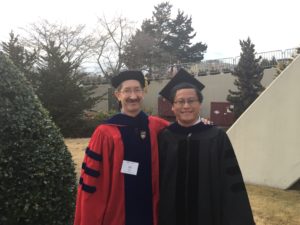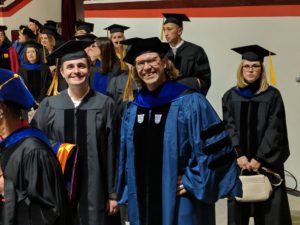Congratulations to DAC graduates!

Ed Fox (left) with Yinlin Chen (right).

Ian Crandell (left) with Scotland Leman (right).
Virginia Tech graduates celebrating their achievements this fall included seven Ph.D. students at the Discovery Analytics Center.
Yinlin Chen received a Ph.D. in computer science and applications and was hooded by his advisor, Edward Fox. Chen’s dissertation, “A High-quality Digital Library Supporting Computing Education: The Ensemble Approach,” was on developing an application pipeline to acquire user-generated computing-related educational resources from YouTube and SlideShare for an educational Digital Library combining transfer learning and crowdsourcing (Amazon Mechanical Turk). He proposed cloud-based designs and applications to ensure and improve these qualities in DL services using cloud computing. Chen works at the Virginia Tech University Libraries, where he has been employed as a software engineer while earning his Ph.D.
Ian Crandell received a Ph.D. in statistics and was hooded by his advisor, Scotland Leman. His dissertation, “Semi-Supervised Anomaly Detection and Heterogeneous Covariance Estimation for Gaussian Processes,” applied methods from spatial statistics to detect anomalous readings in networks of correlated sensor systems. By using a novel correlation based distance metric, he was able to automatically identify anomalous readings based on the past readings of a sensor as well as other sensors in the network. His method also allows for the incorporation of expert knowledge using manual flagging of a small subset of anomalous points. Crandell has joined the Social and Decision Analytics Laboratory in the Biocomplexity Institute of Virginia Tech as a postdoctoral associate and is located in the National Capital Region.
Sherin Ghannam received a Ph.D. in computer engineering and was hooded by her advisor Lynn Abbott. In her dissertation, “Multisensor Multitemporal Fusion for Remote Sensing using Landsat and MODIS Data,” Ghannam cites that the growing Landsat data archive represents more than four decades of continuous Earth observation. Landsat’s role in scientific analysis has increased dramatically in recent years as a result of the open-access policy of the U.S. Geological Survey. However, this rich data record suffers from relatively low temporal resolution due to the 16-day revisit period of each Landsat satellite. She proposes that data-fusion approaches to estimate Landsat images at other points in time combine existing Landsat data with images from other sensors, such as Moderate Resolution Imaging Spectroradiometer (MODIS) from the Terra and Aqua satellites. MODIS provides daily revisits, however, with a spatial resolution that is significantly lower than that of Landsat. Ghannam has relocated to Egypt since graduating in December.
Abhijit Sarkar received a Ph.D. in electrical engineering and was hooded by his advisor, Lynn Abbott. His dissertation, “Cardiac Signals: Remote Measurement and Applications,” investigates the promises and challenges for application of cardiac signals in biometrics and affective computing, and noninvasive measurement of cardiac signals and mainly discusses two major cardiac signals: electrocardiogram and photoplethysmogram. Sarkar’s major research interests include cardiac biometrics, remote plethysmography, computer vision, machine learning, affective computing, driver monitoring and face biometric anti-spoofing. Currently, he is working at the Virginia Tech Transportation Institute, where he was a research assistant while earning his degree.
Saurav Ghosh received a Ph.D. in computer science and applications. His dissertation, “News Analytics for Global Infectious Disease Surveillance,” focuses on developing digital surveillance tools that can perform automated (near) real-time mining of online news reports (unstructured or semi-structured) for monitoring and forecasting infectious disease dynamics in populations at diverse geographical regions of the world. His advisor was Naren Ramakrishnan. Ghosh is currently a Natural Language Processing (NLP) data scientist at Exovera, a subsidiary at SOS International LLC, in Reston, Virginia.
Andrew McCaleb “Caleb” Reach received a Ph.D. in computer science and applications. In his dissertation, entitled “Smooth Interactive Visualization,” Reach developed a formal methodology for smoothness in interactive visualization based on signal processing theory. While a graduate student, he worked at the InfoVis Lab; his advisor was Chris North. He is now working at Google in New York City.
Hao Wu received a Ph.D. in electrical and computer engineering. His dissertation, “Probabilistic Modeling of Multi-relational and Multivariate Discrete Data,” studied and addressed three problems involving the modeling of multi-relational discrete data and multivariate multi-response count data, namely, discovering surprising patterns from multi-relational data; constructing a generative model for multivariate categorical data; and simultaneously modeling multivariate multi-response count data and estimating covariance structures between multiple responses. Wu’s co-advisors were Naren Ramakrishnan and Lynn Abbott. Wu is a software engineer at Google in San Francisco.